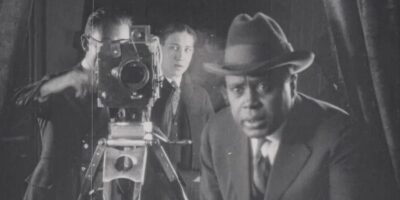Reviewer Reno Lovison picks two more shows currently offered by the Chicago International Film Festival worthy of three star ratings. They are either based in Chicago or have Chicago themes or subjects.
The films have limited in-person options but can be viewed virtually October 14 through October 24, 2021. Check back at CTAA for more International Film Fest reviews. For specific information visit ChicagoFilmFestival.com.

3 stars
On the Edge of Victory
How soon we forget. This intimate behind the scenes documentary “Mayor Pete,” follows his bootstrap campaign for the presidency from its nascent beginnings to the edge of victory.
Sure Pete Buttigieg, (pronounced boot-edge-edge) mayor of a small Midwestern city, speaks eight languages, is a Rhode Scholar and retired lieutenant in the Navy Reserves who served in Afghanistan; but that didn’t stop this over achiever from being the first openly gay presidential candidate, with an odd name, from soaring from unknown candidate to winner of the Iowa caucuses, primarily by being extremely intelligent and being his authentic self.
Like many documentaries, “Mayor Pete” by Jesse Moss simply follows the action. Since it starts at the beginning of the campaign the filmmaker has no idea how it will end. Very often in these situations you know you have an interesting subject but you don’t really know what the story will be.
In this case you have someone who many might consider a nontraditional candidate with a same-sex partner running for the highest office in the land. But the mundaneness of his relationship with husband Chasten and the “regular guy” laid back attitude of Pete himself kinda shouts, “There’s nothing to see here folks,” illustrating that those who we might consider as being “other” really have more in common with us than our perceived differences suggest.
“Mayor Pete,” will certainly appeal to political wonks and historians, though it doesn’t really offer much strategic insight other than some interesting preparation for his debates and appearances. At its core it is an inspirational story of authenticity, personal growth, love and victory; even if that victory is not exactly what you had expected.
Running time: 96 minutes. Visit ChicagoFilmFestival.com for more information.

3 stars
A Harlem Renaissance Man
The small city of Metropolis sits on the southern-most border of Illinois and is best known for its self-described claim to fame as being the “birthplace” of the fictional comic book hero Superman. However the town’s real life native son is author and filmmaker Oscar Micheaux.
Oscar was born in 1884 to former slaves Calvin and Belle Michaux who travelled out of Kentucky over the Ohio River establishing a homestead where the boy spent his early years farming. Eventually he made his way to Chicago getting a very prestigious job as a Pullman porter. This experience no doubt contributed to a wider understanding of the world and introduced him to a more diverse social strata.
Within a short period of time Micheaux was able to obtain a small piece of land in South Dakota. However the harsh winters put his mind to other interests and after a few years he wrote a book about his life experiences and escapades that he self-published then sold door-to-door apparently rather successfully within Black communities.
After gaining some notoriety Micheaux turned down an offer to make one of his stories into a moving picture. Instead in 1919 he opted to buy some equipment, gather some people and do it himself, putting him on the road that would ultimately establish him as the first major Black filmmaker, going on to produce 42 feature films.
Micheaux’s filmmaking business brought him to Harlem, the undisputed Black Capitol of segregated America, at the very dawn of what would become known as the Harlem Renaissance no doubt putting him in contact with some of the most notable cultural icons of that era. Micheaux is in fact credited with hiring Paul Robeson before the actor became an international superstar.
It seems that aside from promoting his own written works Micheaux had a desire to use his early silent films and later talkies to project a more wholesome and authentic view of African-American life presumably to counteract the negative stereotypes that were being portrayed in White cinema, most notably in films like D.W. Griffith’s (1915) “Birth of a Nation.”
At least from my perspective Micheaux’s story is as much about his entrepreneurial spirit as it is about his filmmaking. Not only did he write and produce film but often appeared in small roles and set up his own distribution scheme to insure that his films would be screened and seen in African American communities nationwide. It seems he was one of those people who was going to create a place for himself in this world somehow.
“Oscar Micheaux – The Superhero of Black Cinema” had its North American premiere as part of the 2021 Chicago International Film Festival. Directed by Francesco Zippel, it is a sort of meandering biographical documentary that gets this important story told through a number of expert interviews and original film clips.
The importance of this documentary is perhaps to illustrate to younger generations that in the early nineteen hundreds there were a number of African American entrepreneurs who stepped in to fill a void created by segregation.
They operated their professions and crafts parallel to the more influential white power structure by exploiting opportunities to serve a market that was otherwise being neglected.
As a result of America’s unofficial apartheid system these early industrial pioneers rarely were recognized by the wider society for the contributions they made.
“Oscar Micheaux -The Superhero of Black Film Making” is a useful contribution to the library of Black History subjects placing Micheaux into the pantheon of individuals who contributed to the rise of twentieth century African American culture and ultimately, in a more “woke” sense, to the fabric of American culture as a whole.
Running time: 80 minutes. Visit ChicagoFilmFestival.com for more information.
Reno Lovison
